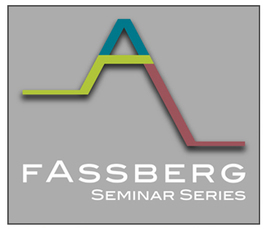Fassberg Seminar - ONLINE SEMINAR: Coordinated efforts: In vivo dynamics of co- and posttranscriptional gene regulation
Fassberg Seminar - ONLINE SEMINAR
- Datum: 28.09.2021
- Uhrzeit: 14:00 - 15:00
- Vortragende(r): Lydia Herzel
- Gene-Wei Li lab, MIT Biology, USA
- Ort: Max-Planck-Institut für biophysikalische Chemie (MPIBPC)
- Raum: Zoom Online Seminar
- Gastgeber: Patrick Cramer
- Kontakt: gd.office@mpibpc.mpg.de

From bacteria to humans, mRNAs are frequently modified or processed while they get synthesized by transcription and afterwards, i.e. co- and posttranscriptionally. How this is coordinated in space and time is still incompletely understood. I study the dynamics and coordination of mRNA regulation in fungi and bacteria by harnessing the natural transcriptome diversity that I read out with tailored long- and short-read RNA sequencing approaches. In combination with cellular fractionation, genetics, and integrative data analysis, I gain high resolution, single transcript snapshots of the different stages of gene expression.
Previously, we discovered that pre-mRNA splicing is largely instantaneous with intron synthesis and multi-intron genes are spliced in an “all-or-none” fashion in yeast. Currently, I investigate the interconnection of translation and mRNA decay that potentially sets limits on the portion of transcripts available for functional protein synthesis. I am analyzing the composition of the bacterial transcriptome regarding the abundance of nascent, mature and decaying mRNAs, and to what extent these mRNA species get translated. I find that against our expectation, fast-growing E. coli cells have only few mature mRNAs at a given time, which when further reduced has a substantial impact on the translation capacity of the cell. These results suggest that the heterogeneity of cellular mRNAs plays important roles in gene expression and cell physiology that I will investigate further in the context of fungal and bacterial pathogenicity.
Previously, we discovered that pre-mRNA splicing is largely instantaneous with intron synthesis and multi-intron genes are spliced in an “all-or-none” fashion in yeast. Currently, I investigate the interconnection of translation and mRNA decay that potentially sets limits on the portion of transcripts available for functional protein synthesis. I am analyzing the composition of the bacterial transcriptome regarding the abundance of nascent, mature and decaying mRNAs, and to what extent these mRNA species get translated. I find that against our expectation, fast-growing E. coli cells have only few mature mRNAs at a given time, which when further reduced has a substantial impact on the translation capacity of the cell. These results suggest that the heterogeneity of cellular mRNAs plays important roles in gene expression and cell physiology that I will investigate further in the context of fungal and bacterial pathogenicity.